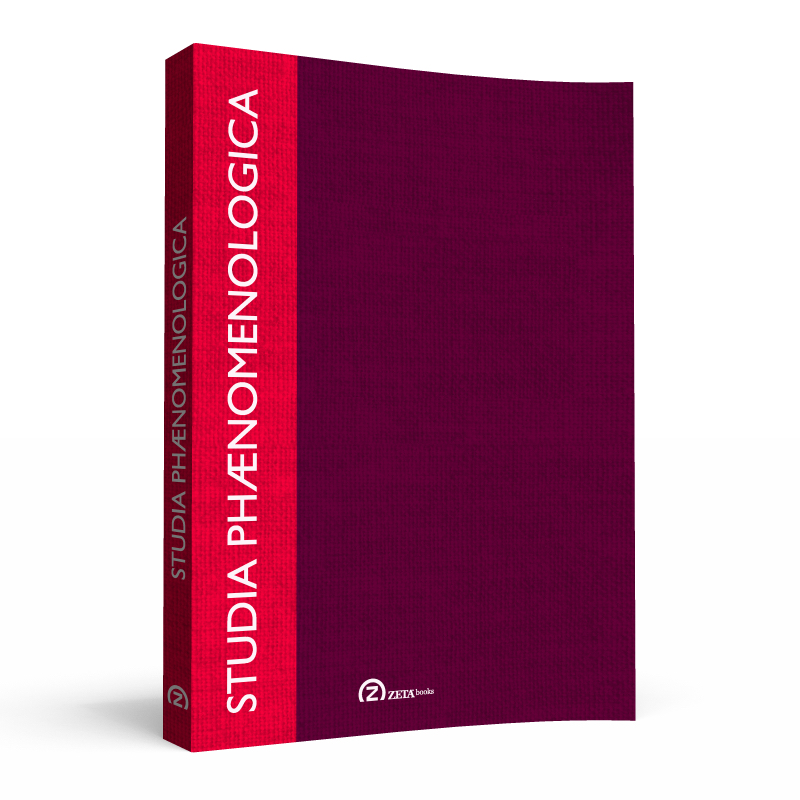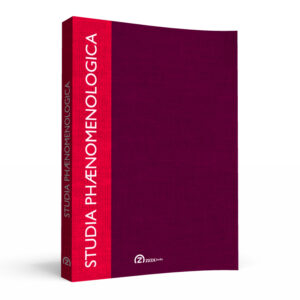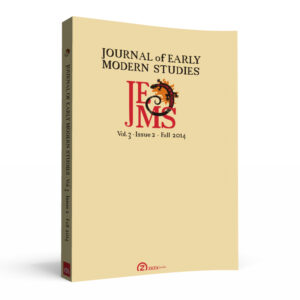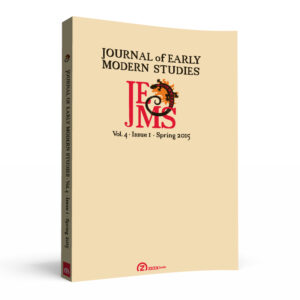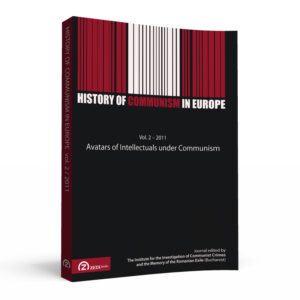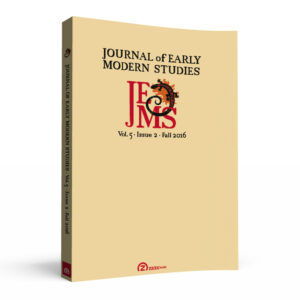The Editorial Board: A Decade with Studia Phænomenologica
PHENOMENOLOGY AND PSYCHOLOGY
Delia Popa, Virgil Ciomoș: Introduction: Phenomenology and Psychology [OPEN ACCESS]
Eric S. Nelson: Impure Phenomenology: Dilthey, Epistemology, and Interpretive Psychology
Abstract: Responding to critiques of Dilthey’s interpretive psychology, I revisit its relation with epistemology and the human sciences. Rather than reducing knowledge to psychology and psychology to subjective understanding, Dilthey articulated the epistemic worth of a psychology involving (1) an impure phenomenology of embodied, historically-situated, and worldly consciousness as individually lived yet complicit with its naturally and socially constituted contexts, (2) experience- and communication-oriented processes of interpreting others, (3) the use of third-person structural-functional analysis and causal explanation, and (4) a recognition of the ungroundability, facticity, and conflict inherent in knowledge and life.
Ion Tănăsescu: Le concept psychologique de la représentation de la fantaisie chez Brentano et sa réception chez Husserl
Abstract: The article analyses the psychological aspects of “phantasy presentation” in Brentano’s lecture Ausgewählte Fragen aus Psychologie und Ästhetik dated 1885/1886. It focuses primarily on two major aspects of Brentano’s work: (1) the traditional understanding of phantasy presentation as intuitive presentation, and as fundamentally related to the perceptual presentation; (2) Brentano’s conception according to which phantasy presentations are “concepts with intuitive nucleus”. In this context, the text focuses on the following topics: the relation between the inauthentic presentations of the phantasy and perceptual presentations; the relation between presentations with attributive unity and surrogate presentations in logic; and the relation between the intuitive and conceptual element in the constitution of phantasy presentations. The study argues that, despite the title of the lecture—Ausgewählte Fragen aus Psychologie und Ästhetik—Brentano’s analysis of phantasy presentation does not refer to the aesthetic function, but to the psychological function of this presentation. Furthermore, it argues that the psychological aspect of phantasy presentation represents one of the main aspects of Brentano’s work, subsequently used by Husserl in his studies to underline the differences between the perceptual and phantasy presentation.
Maria Gyemant: Objet et contenu: L’intentionnalité husserlienne face à son héritage psychologiste
Abstract: This paper aims to show how Husserl’s concept of intentionality detaches itself from the background of a thorough and recurrent argument that Husserl makes against psychologism. Noting that the concept of intentionality was first recovered by Brentano’s psychology, it seemed to us important to show how Husserl’s intentionality, as it is conceived in the Logical Investigations, distinguishes itself from the “intentional inexistence” that Brentano describes in his Psychology from an Empirical Standpoint. Showing which parts of Brentano’s psychology were rejected and which were maintained in Husserl’s theory is indeed the first concern of those who intend to study the phenomenological concept of intentionality.
Guillaume Fréchette: L’intentionnalité et le caractère qualitatif des vécus.Husserl, Brentano et Lotze
Abstract: Lotze’s influence on the development of the XIXth and XXth century philosophy and psychology remains largely neglected still today. In this paper, I examine some Lotzean elements in Husserl’s early conception of intentionality, and more specifically in his rejection of the Brentanian concept of intentionality. I argue that Husserl and Lotze, pace Brentano, share a qualitative conception of experiences, what they both call the Zumutesein of experiences. Furthermore, I discuss other issues upon which Husserl and Lotze share common intuitions: the perception of space, the theory of local signs, the realisations of thinking (Leistungen des Denkens) and phenomenology.
Daniel J. Marcelle: Aron Gurwitsch’s Incipient Phenomenological Reduction: Another Way into Phenomenological Transcendental Philosophy from Psychology
Abstract: Aron Gurwitsch wants to introduce a theory of organization developed by Gestalt psychology into Husserlian phenomenology. The problem is to show how it is possible to introduce a theory developed within a positive science into philosophical phenomenology. His solution is to show that aspects of this theory already are or can be phenomenological through what he calls an incipient phenomenological reduction. Specifically, it is the dismissal of the constancy hypothesis in which he identifies the possibility moving from an explanatory science to a descriptive one. If the temptation can be resisted of returning to an explanatory approach and description can be radicalized, Gurwitsch believes that this reduction can become phenomenological and even attain transcendental levels. This possibility of reduction makes it possible for scientists, especially psychologists, to have a firsthand understanding of phenomenology, perhaps to convince them of this approach and realize the continuity of philosophy and the sciences and the need to maintain cooperation via phenomenology.
Peter A. Varga: Psychologism as Positive Heritage of Husserl’s Phenomenological Philosophy
Abstract: Husserl is famous for his critique of foundational psychologism. However, his relationship to psychologism is not entirely negative. His conception of philosophy is indebted also to nineteenth-century ideas of a psychological foundation of logic and philosophy. This is manifest both in historical influences on Husserl and in debates between Husserl and his contemporaries. These areas are to be investigated, with a particular focus on the Logical Investigations and the works from the period of Husserl’s transition to the transcendental phenomenology. It is hoped that the investigation could contribute towards the better understanding of Husserl’s idea of the foundation of his phenomenology.
Pierre-Jean Renaudie: La psychologie et le « chemin de croix » de la phénoménologie transcendantale
Abstract: This article focuses on the analysis of the highly problematic relationship between Psychology and Phenomenology in Husserl’s Crisis of European Sciences, in order to show that this last writing allows us to reconsider the criticisms addressed to descriptive psychology since the first breakthrough of phenomenology. Husserl not only tries to bring psychology back into phenomenological field by describing it as a privileged “way to reduction”, but he more fundamentally shows that the closest examination of the crisis-structure of psychology is essential to the understanding of subjectivity. The psychological dimension of subjectivity is neither a mere difficulty of transcendental philosophy, nor an accident in the history of subjectivity, but it discloses the problem upon which lays the transcendental meaning of subjectivity. According to this point of view, Psychology has to deliver its fullness of content and its empirical richness to subjectivity, and so to give phenomenology back its descriptive dimension.
Yasuhiko Murakami: Affection and Cogitatio. Psychopathology and Husserl’s Theory of Meaning
Abstract: Behind the phase of cognition analysed by Husserl, there is a phase of affection. In this phase, there are significant mental disorders occurring. Similar to the way in which the phase of cognition is divided into reference, meaning (referent), and representation of words (classification according to Husserl’s theory of meaning), the phase of affection is also divided into reference, “meaning,” and figure as sphere of “meaning”. The situation as a reference can allow various predications to form different explanations, i.e. different states of affairs. From the point of view of affection, this reference has another role. The affection of a situation obliges us to produce bodily “meanings,” which is a sign of health. Mental disorders can be described as some distortion in the phase of affection. Healing in this regard occurs through the restoration of creativity for “meanings” which assume the situation.
Raoul Moati: De l’intentionnalité à la pulsionnalité: La subjectivation du Todestrieb
Abstract: The aim of this article is to examine the scope of the commentary made by Jacques Lacan in his Séminaire on the concept of phenomenological intentionality. By re-writing the object of the drive in a topological space / curve, Lacan intended to give full value to a certain number of defining traits of Freudian drive against its interpretation into any kind of non-critical intentionalism. This specifically required that the French psychoanalyst emphasize the vicariousness of the drive in relation to any defined object / goal which induces the irreducible “perverse polymorphic” nature of any drive. Our article also seeks to demonstrate that Lacan did not agree with the repudiation of the concept of “intention” which he had inherited from phenomenology and which he had reworked under Freud’s patronage, but had subverted its scope in the passage from intentionality to pulsionality by which he expected to achieve disidentification of the desired objective / goal from the pulsional satisfaction goal. Through this complication, we seek to re-open the issue of limits that the concept of intentionality encounters when it meets post-Freudian metapsychology.
Alain Loute: Identité narrative et résistances: Le travail de la mise en intrigue
Abstract: The objective of this article is to reflect on the impact that Ricoeur’s work on psychoanalysis (following his book on Freud) might have on his concept of narrative identity. In these texts, one of the points he draws from psychoanalysis is that resistance mechanisms can hamper the process of self-recognition of the subject through the story that he tells himself about himself. These resistance mechanisms cannot be put to an end simply by understanding them intellectually. These writings teach us that, in order to be brought to an end, these resistance mechanisms require more than the willingness to appropriate one’s own narrative identity. An appropriate technique to handle energies must be put into place. This explains why the production of a narrative identity can sometimes take the form of a real work.
Anita Williams: The Importance of the Theoretical Attitude to Investigations of the Life-World
Abstract: Edmund Husserl’s critique of using the natural scientific method to investigate meaningful human experience remains relevant to recent debates in psychology. Discursive Psychology (DP) claims to draw upon phenomenological insights to critique quantitative psychology for studying theoretical concepts rather than the actual practices of the lived social world. In this paper, I will argue that DP overlooks the important distinction that can be made between the theoretical attitude and the natural scientific attitude in Husserlian Phenomenology and hence, once again, loses sight of the meaningfully constituted life-world. In doing so, I will demonstrate the continued relevance of Husserl’s critique of natural science to the discipline of psychology.
INTERVIEW
Irina Rotaru: Die ethische Priorität des Außerordentlichen: Interview mit Bernhard Waldenfels
Abstract: This interview took place on the 8th of April 2010 in München, at Professor Waldenfels’ house. The questions for this interview were meant to touch the most important ideas of Bernhard Waldenfels’ philosophy—the idea of universal order as a sign for a limited and dictatorial thinking, the respondent that replaces the traditional subject, the idea that an ethics according to which a subject is responsible for something to someone overestimates the unity of the subject and does injustice to all the three instances of a happening (subject—for something—to someone). Waldenfels clarifies some of the problematic implications of these ideas.
VARIA
Vincent Blok: Heidegger und der Nationalsozialismus oder die Frage nach dem philosophischen Empirismus
Abstract: This contribution discusses the philosophical meaning of Martin Heidegger’s Rectoral address. Firstly, Heidegger’s philosophical basic experience (Grunderfahrung) is sketched as providing the background of his Rectoral address: the being-historical concept of beginning (Anfang). Next, the philosophical question of the Rectoral address is discussed. It is shown that Die Selbstbehauptung der deutschen Universität is inquiring into the identity of human being (Dasein) in connection with the question about das Eigene (the Germans) and das Fremde (the Greeks). This opposition structures the confrontation with the beginning of philosophical thinking in the Rectoral address. When read against the philosophical background sustaining the Rectoral address, words that appear in it, such as “Kampf,” “Macht,” “Volk,” and “Marsch” have nothing in common with the same words as used by the Nazis. It is shown that the Rectoral address is an extremely ambiguous text, because it claims a transformation of human Dasein. Although Heidegger’s view on National Socialism is distinguished from Nazi ideology, it is clear that he made a mistake about Hitler. The article explores how Heidegger later changed his mind and vocabulary, and in what way this kind of mistakes and changes of mind are inherent to philosophical empiricism.
Parvis Emad: Heidegger and the Question of Translation: A Closer Look
Abstract: This paper has two closely related objectives. (a) Relying on the most recent studies devoted to the question of Heidegger and translation, this paper takes a closer look at this question by examining the comments Heidegger made on the issue of translation in the course of a seminar he gave in 1951 at Cérisy-la-Salle. (b) Drawing upon the concept of a productive translation that Heidegger puts forth in that seminar, and distinguishing a being-historical (seinsgeschichtliche) work from a historical presentation (historische Darstellung) the paper at the end attempts a critical assessment of the English translation of Heidegger’s Nietzsche.
Gilbert Gérard: La constellation de l’être: Lecture d’Identité et différence de Heidegger
Abstract: This article inquires into that which articulates the two texts brought together by Heidegger in Identity and Difference. It sets out from the indications provided in the Preface of the work concerning the “harmony” that reigns between what is at stake at the heart of the two texts, namely what Heidegger respectively calls the Ereignis (event of appropriation) and the Austrag (reconciling difference). The understanding of this harmony makes it possible to approach that which unveils itself as the articulation of Being, but in so doing also raises the difficult problem of the very possibility of thinking Being setting out from its essential withdrawal.
Christophe Perrin: L’origine et les fondements de la question cartésienne chez Heidegger
Abstract: Showing a very early interest in Descartes, after having first considered him as a Christian thinker in the perspective of a deconstruction of religious life, Heidegger soon regards him as the major obstacle to the phenomenological analyses he wants to develop, as part of the first ontological search he gave himself: that of a hermeneutics of facticity. Therefore, the latter immediately takes in his work the shape of a hermeneutics of the I think, therefore I am, its author being blamed for having entirely ignored the sense of being in the I am, focused as he is on the thinking ego, the ins and outs of which he develops. But the criticism also applying to Husserl, it is by laying the blame on his master, that Heidegger intends to radicalize the project of his own master, hence the necessity to throw light on the origin and the foundations of what we can call the Cartesian question in Heidegger.
Rolf Kühn: Bergson und die Phänomenologie des Lachens
Abstract: Ever since antiquity, philosophy has continuously striven to grasp the phenomenon of humor and laughter, while, in modern times, Bergson certainly holds a special place,\ with his interpretation of laughter, and particularly “humor”, as a form of social sanction. However, such an analysis neglects the fact that the ability to laugh is actually grounded in a primordial sphere of life-affection as such, so that, starting from here, we could understand laughter, in connection with the radical-phenomenological essence of life itself, as being essentially joy.
Frédéric Seyler: La fonction quasi-performative de la Phénoménologie de la vie et son enjeu éthique
Abstract: Michel Henry’s phenomenology of life or radical phenomenology understands life as immanent and transcendental affectivity. From this point of view, ethics can be characterized as the ethics of affectivity, the central stake of which lies in the recognition of life. However, the question is to what extent a philosophical discourse can be held on a reality that, being immanent, is principally inaccessible for intentionality and how such discourse is in fact possible. As radical phenomenology relies on certainty opposed to evidence, it can be shown that both the possibility and the practical effectiveness of its discourse are ultimately rooted in life’s self-revelation. Henry’s works may then be understood as mediation towards the recognition of life, especially through the concepts of quasi-performativity and translation.
ISSN: 1582-5647 (print)
ISSN: 2069-0061 (online)
ISBN 978-973-50-2820-6 (paperback)
ISBN: 978-973-50-2821-3 (eBook)

